The supply chain industry in the Philippines faces numerous challenges, including inefficiencies in inventory management, delivery delays, and a lack of real-time visibility. These issues hinder businesses from meeting customer expectations and optimizing operations.
AI supply chain software provides an innovative solution by automating processes, enhancing forecasting, and improving communication. With advanced algorithms, businesses can streamline their operations, reduce costs, and improve their decision-making capabilities.
Ano pa hinihintay mo? Keep reading to explore the top 10 AI-powered software supply chain security solutions in the Philippines and find out how these amazing tools can help your business thrive!
Table of Contents

Key Takeaways
|
What is AI in Supply Chain?
AI in the supply chain applies artificial intelligence to automate and optimize operations. It enables more intelligent decisions, cost reduction, and rapid adaptation to changes by utilizing machine learning, robotics, and data analysis.
Key areas where AI plays a role include demand forecasting, supply chain management, inventory management, logistics, and warehouse automation. It also aids in supplier risk assessment, predictive maintenance, and enhancing customer service through chatbots.
For example, Amazon utilizes AI to predict customer demand, automatically restock items, and guide robots in its warehouses. It also plans the fastest delivery routes, making its supply chain faster and more efficient.
What is AI Supply Chain Software?
AI supply chain software is a digital tool that uses artificial intelligence to manage, analyze, and improve supply chain operations. It automates tasks, predicts outcomes, and supports faster, data-driven decisions across sourcing, production, inventory, and delivery.
This software often includes features like demand forecasting, route optimization, real-time inventory tracking, and supplier risk analysis. It can also integrate with other systems, such as ERP or CRM, to provide a comprehensive view of the supply chain.
Companies utilize AI supply chain software to enhance efficiency, lower costs, and respond more promptly to disruptions or shifts in demand.
Benefits of AI Supply Chain Software
AI supply chain software offers a range of advantages that go beyond simple automation. By leveraging data and intelligent algorithms, it transforms how businesses plan, operate, and deliver their services. Here are some key benefits that highlight its impact across the entire supply chain.
- Improved forecast accuracy: AI analyzes past data and trends to more accurately predict demand. It helps businesses avoid overproduction or running out of stock.
- Faster decision-making: Real-time data and AI insights enable quick responses to supply chain changes. Teams can act instantly on delays or disruptions.
- Cost reduction: By automating manual tasks and optimizing routes and inventory, AI helps lower labor, storage, and transportation expenses.
- Enhanced efficiency: AI streamlines processes like warehouse operations, inventory tracking, and order fulfillment. It reduces errors and speeds up workflows.
- Better risk management: AI detects early warning signs of problems, such as supplier delays or equipment issues. Businesses can then take proactive steps to reduce the impact.
- Greater customer satisfaction: Faster deliveries, accurate orders, and better tracking lead to happier customers and fewer complaints.
- Sustainability gains: Optimized routes and more innovative inventory planning reduce energy use, waste, and emissions, supporting eco-friendly practices.
Top 10 AI Supply Chain Software
As businesses continue to face challenges in managing complex supply chain operations, AI-powered software solutions have emerged as a game-changer. Let’s explore the top 10 AI supply chain software solutions that are revolutionising the industry and enabling businesses to enhance efficiency and reduce costs.
1. HashMicro AI Supply Chain Software
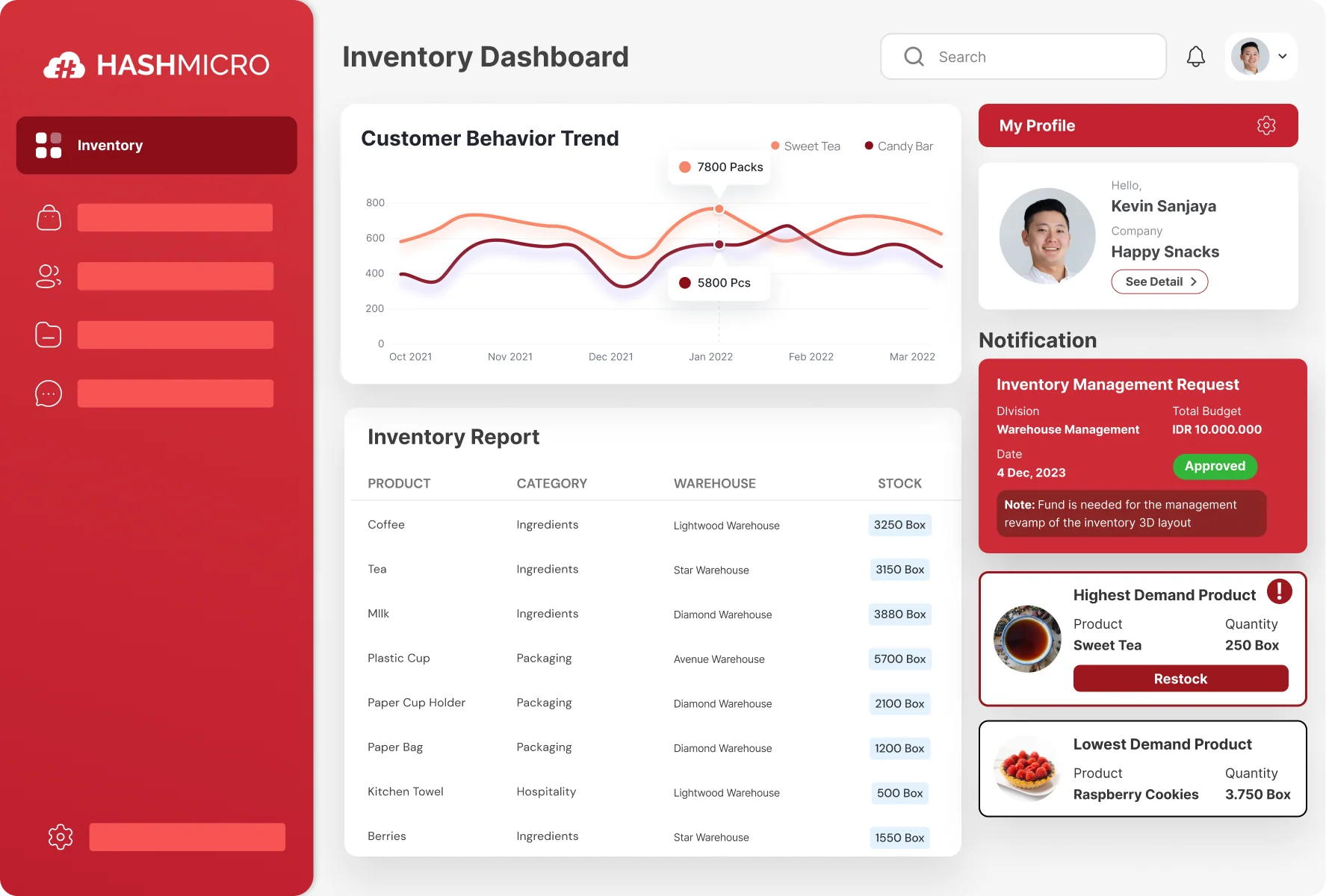
Founded in 2015, HashMicro has emerged as a leading provider of AI-driven supply chain software in the Philippines. With over 2,000 clients across Southeast Asia, HashMicro AI Supply Chain Software delivers user-friendly and comprehensive SCM solutions.
HashMicro AI Supply Chain Software offers valuable benefits for those exploring its capabilities, including a free demo, business consultations, and unlimited user access without special requirements.
With a strong commitment to streamlining complex and sustainable supply chain processes, HashMicro AI Supply Chain Software delivers top-tier features powered by advanced artificial intelligence. Below are some of the prominent features.
- Return management: Efficiently handle product returns from customers with seamless tracking and real-time updates to stock levels.
- Shipment tracking: Monitor courier locations in real-time to ensure every order reaches the customer’s address promptly and accurately.
- Low stock alerts with innovative suggestions: Receive automatic alerts when inventory levels drop below the set threshold, along with AI-powered restock recommendations for the right products.
- Automated planning & forecasting: Generate production, procurement, and inventory plans automatically using historical data to meet future customer demand consistently.
- Real-time stock updates via AI chat: Instantly check detailed, up-to-date warehouse inventory through the built-in AI chat feature for accurate decision-making.
| Pros | Cons |
|
× There is a free demo queue due to high demand × Due to its comprehensive system, this software is more suitable for medium to large-sized companies. |
If you are interested in implementing the HashMicro system, take your first step by downloading the pricing scheme. Click the banner below to find out.

2. Kinaxis
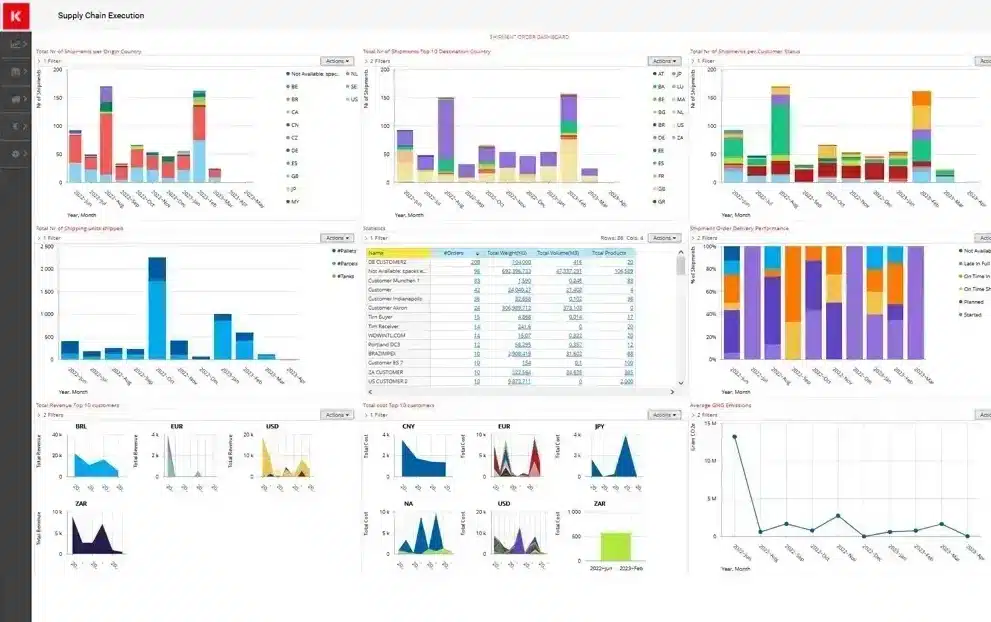
Kinaxis enhances supply chain decision-making with fast, accurate insights powered by advanced AI. Its standout feature, RapidResponse, helps businesses quickly adapt to market shifts with precision and agility.
Kinaxis’s prominent features are:
- AI-powered demand and supply forecasting: Leverages artificial intelligence to predict fluctuations and align supply with demand.
- Scenario-based planning tools: Help businesses simulate and prepare for various market conditions in advance.
- Instant decision-making capabilities: Enables quick, informed responses through real-time data analysis.
- ERP system integration: Seamlessly connects with leading ERP platforms to ensure cohesive and efficient operations.
| Pros | Cons |
|
× High implementation costs and time × Extensive training needed × Best for larger enterprises × Relies on robust IT infrastructure |
3. C3 AI
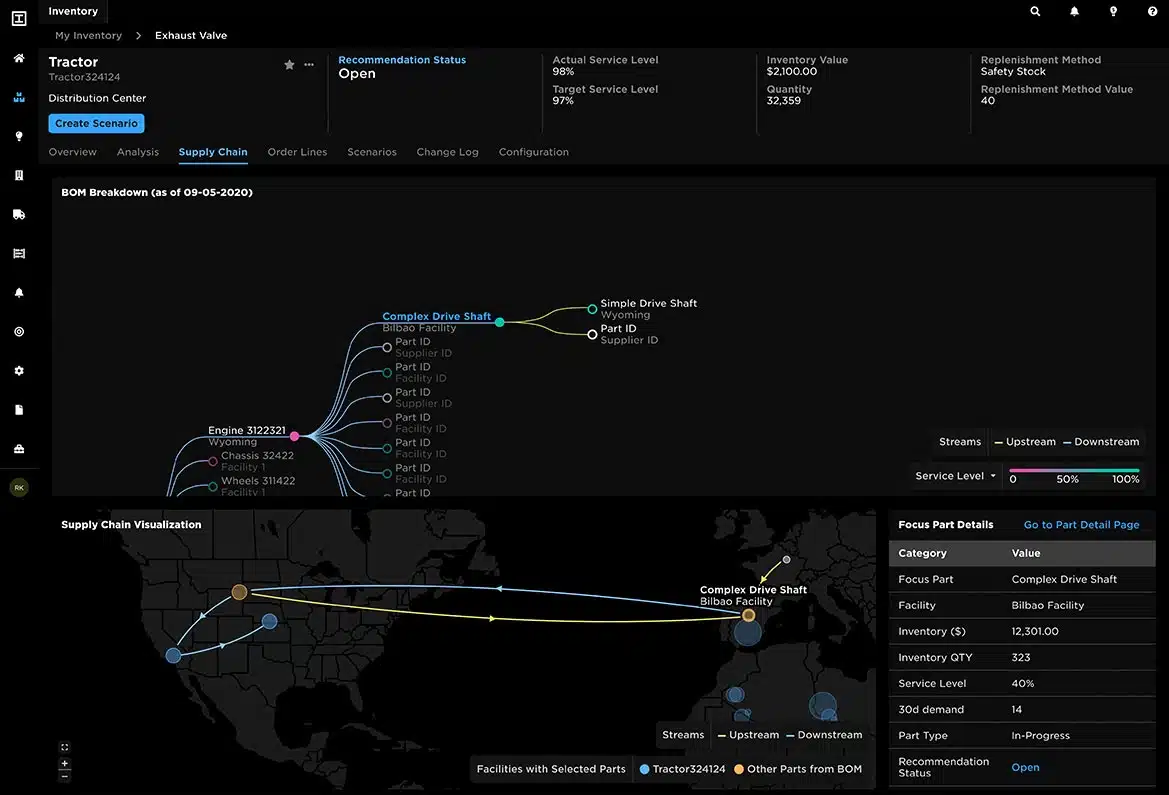
If you’re seeking a cutting-edge solution, C3 AI stands out. Equipped with advanced machine learning and big data capabilities, it’s ideal for tech and manufacturing industries, offering powerful, data-driven insights.
C3 AI’s prominent features are:
- Proactive risk assessment: Identifies potential supply chain disruptions before they impact operations, enabling timely mitigation.
- Real-time monitoring of supplier performance: Tracks supplier activities continuously to ensure reliability and quality.
- Demand forecasting with machine learning: Uses AI to predict customer needs and optimize inventory planning accurately.
| Pros | Cons |
|
× High initial investment × Steep learning curve × Limited relevance for small businesses × Requires skilled IT support |
4. Oracle Supply Chain AI Software
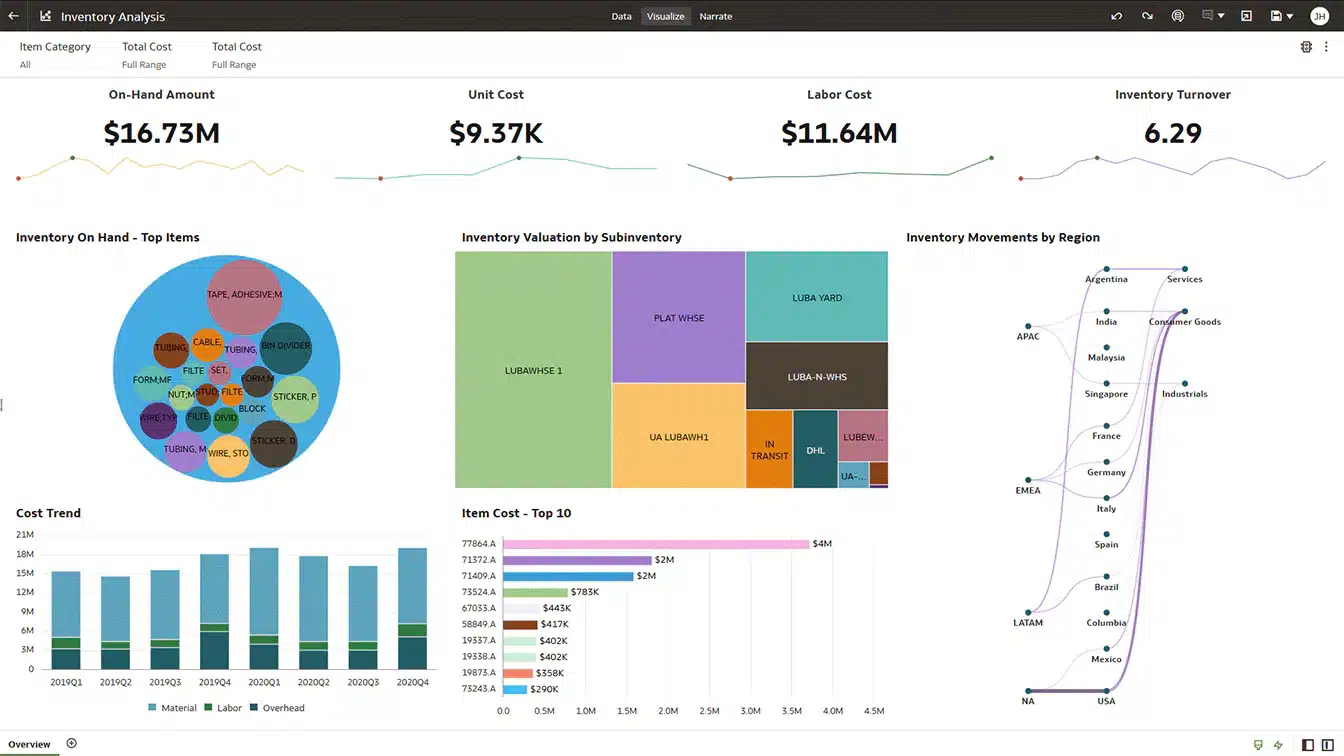
Oracle is a global technology leader that provides flexible, scalable, AI-driven supply chain management solutions for enterprises. With predictive tools, automation, and deep analytics, it enhances efficiency and accuracy.
Oracle’s prominent features are:
- Machine learning-based demand forecasting: Accurately predicts customer demand to help optimize inventory and production plans.
- Automated order and logistics management: Streamlines order processing and shipping to improve delivery speed and reduce manual effort.
- End-to-end supply chain visibility: Provides real-time tracking and monitoring for better control over supply chain operations.
- Proactive risk and performance analytics: Identifies potential disruptions and performance issues early with advanced analytics tools.
| Pros | Cons |
|
× Best suited for large enterprises × High system complexity × Demands a strong IT infrastructure |
5. Blue Yonder
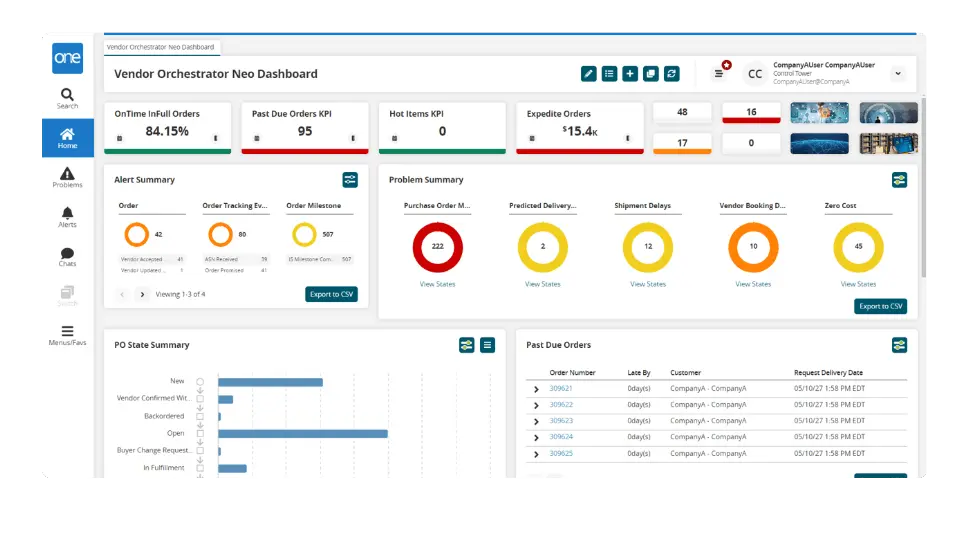
Blue Yonder is a supply chain software provider that helps businesses enhance operational efficiency and make smarter, data-driven decisions. Companies widely adopt it to manage complex supply chain processes and drive digital transformation efforts.
Blue Yonder’s prominent features are:
- Optimized shipping and distribution: AI helps streamline delivery routes and distribution processes, resulting in faster and more cost-effective shipments.
- Automated inventory management: Stock levels are tracked and updated automatically, thereby reducing the risk of overstocking or stock shortages.
- Real-time demand tracking: Monitor and respond to changes in customer demand instantly to maintain accurate supply levels.
- AI-driven supply chain planning: Generate innovative, data-based strategies for procurement, production, and inventory with greater precision.
| Pros | Cons |
|
× It may be too complex for smaller businesses × High initial implementation cost × Lengthy adaptation period × Customer support can be slow |
6. Infor
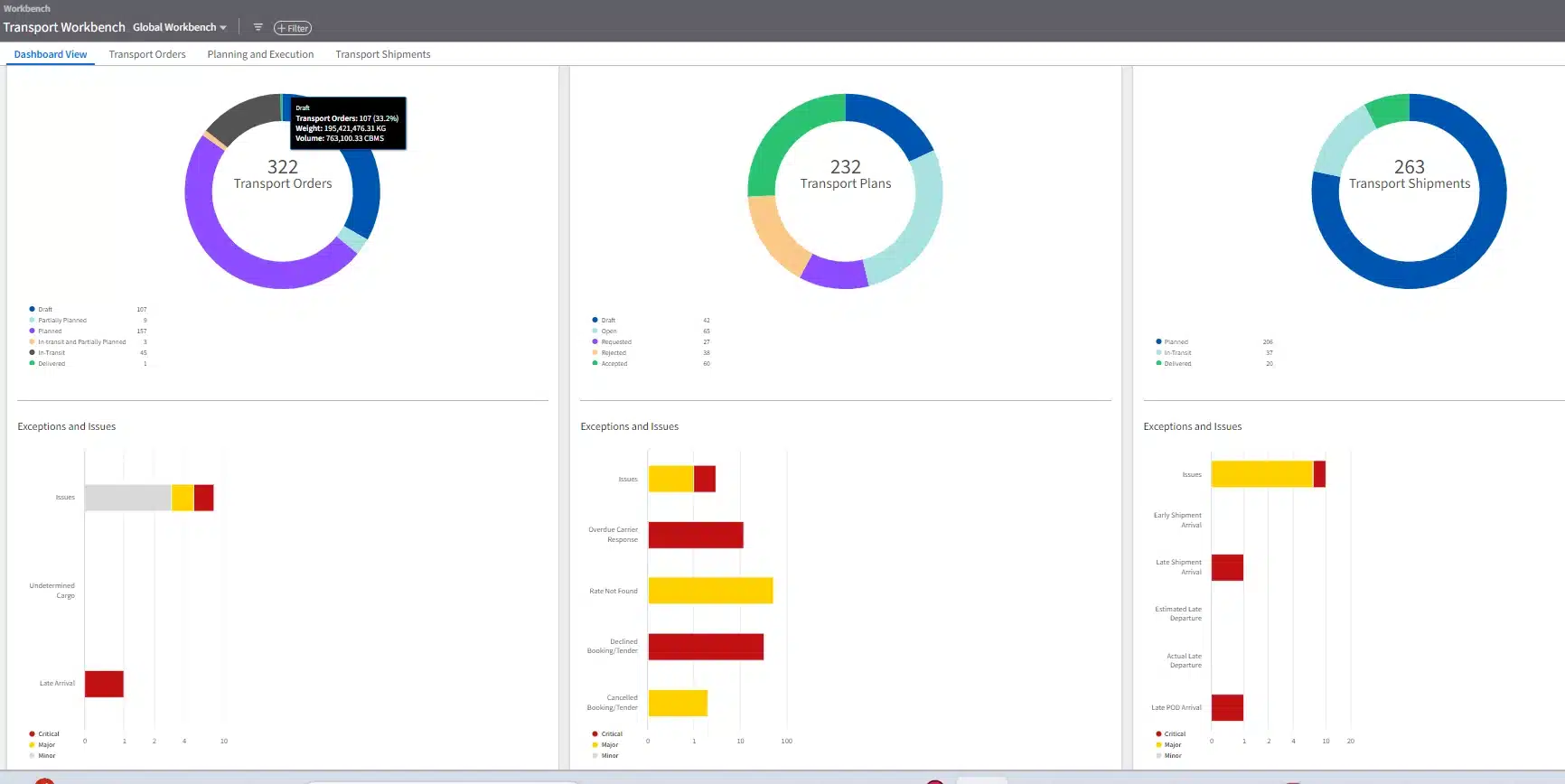
Infor is a recognized ERP provider offering supply chain software with automation and integration. Its cloud-based system streamlines inventory management, distribution, and demand planning for efficiency.
Infor’s prominent features are:
- Scalable and flexible supply chain management: Adapts easily to changing business needs and supports growth across various industries.
- AI-enhanced CloudSuite Supply Chain: Leverages artificial intelligence to improve accuracy, speed, and decision-making in supply chain operations.
- Real-time analytics dashboard: Provides instant insights through data-driven visuals to support better strategic planning.
- Automated & predictive production scheduling: Uses advanced algorithms to forecast demand and optimize production plans efficiently.
| Pros | Cons |
|
× Lengthy setup process × Steep learning curve × An extensive initial configuration is required |
7. FourKites Supply Chain AI Software
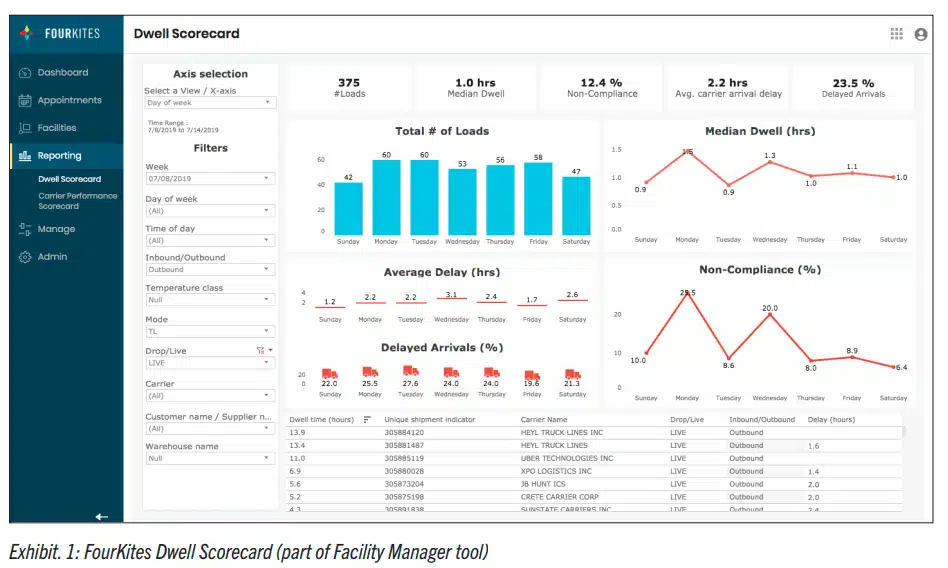
FourKites is a top solution for businesses seeking complete supply chain visibility. It offers real-time shipment tracking, enabling companies to monitor goods in transit with exceptional accuracy.
FourKites’ prominent features are:
- AI-driven delay predictions: Accurately forecast shipment delays to enable proactive decision-making.
- Seamless integration with ERP and logistics systems: Connects effortlessly with various platforms for streamlined operations.
- User-friendly visualization dashboard: Presents supply chain data in a clear, interactive format.
- Accurate real-time shipment monitoring: Offers live tracking to ensure complete visibility of goods in transit.
| Pros | Cons |
|
× Time-consuming implementation × Limited features in the basic plan × Dependence on stable internet |
8. HAVI
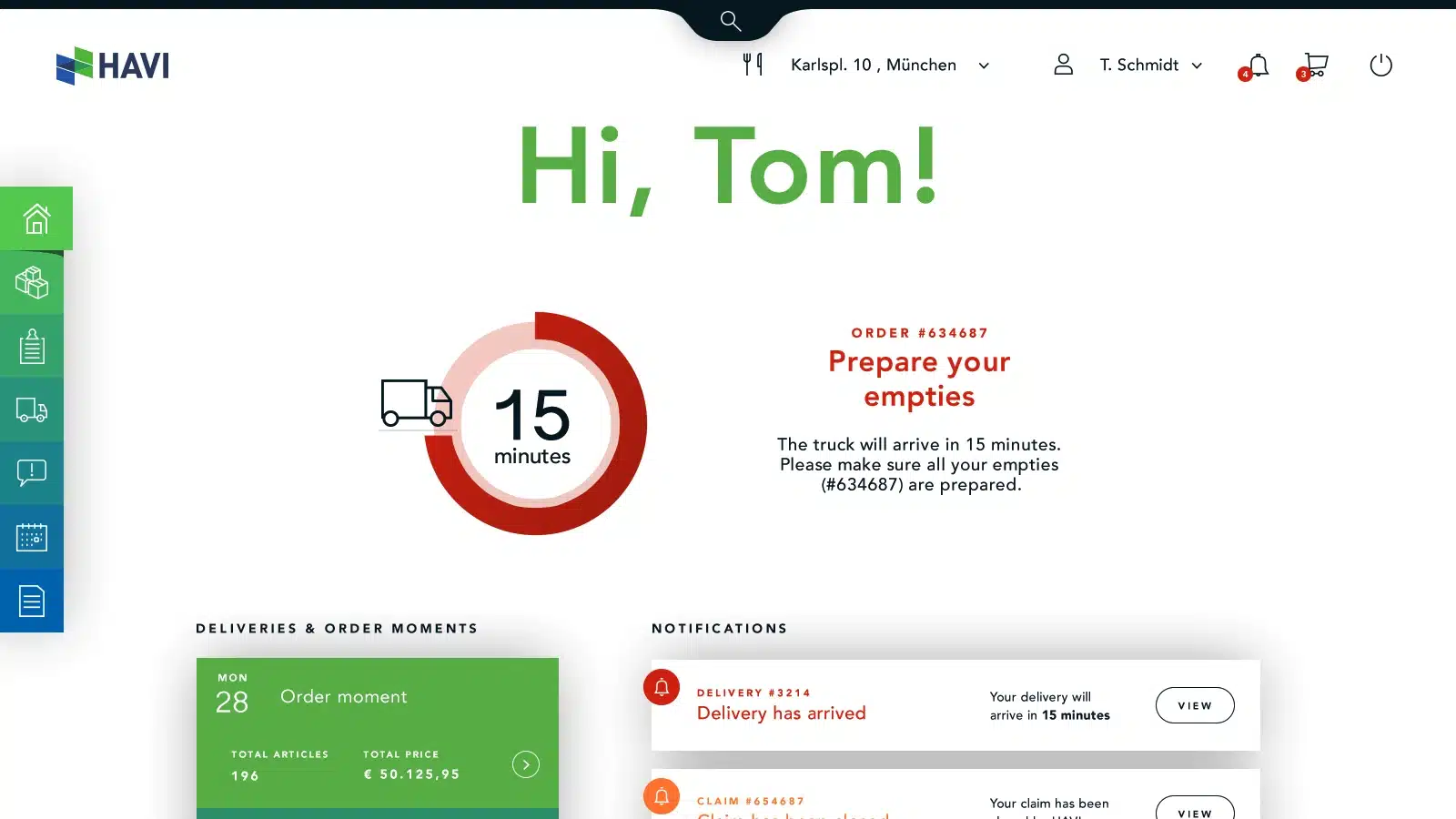
HAVI partners with businesses to optimize supply chains, offering integrated logistics solutions for procurement, distribution, and performance analysis. Utilizing AI technology, HAVI improves data accuracy and visibility throughout the supply chain.
HAVI’s prominent features are:
- Predictive data for optimized distribution: Utilizes AI to streamline delivery routes and improve distribution efficiency.
- AI-driven performance insights: Offers intelligent analytics to evaluate and enhance supply chain performance.
- Live shipment tracking: Enables real-time monitoring to ensure timely and accurate deliveries.
- Unified procurement management: Integrates purchasing processes to boost coordination and reduce delays.
| Pros | Cons |
|
× A long implementation process may delay deployment × Customization options are limited for specific business needs × Higher service costs could be a barrier for some companies × Less ideal for small-scale businesses due to system complexity |
9. IBM Watson Supply Chain
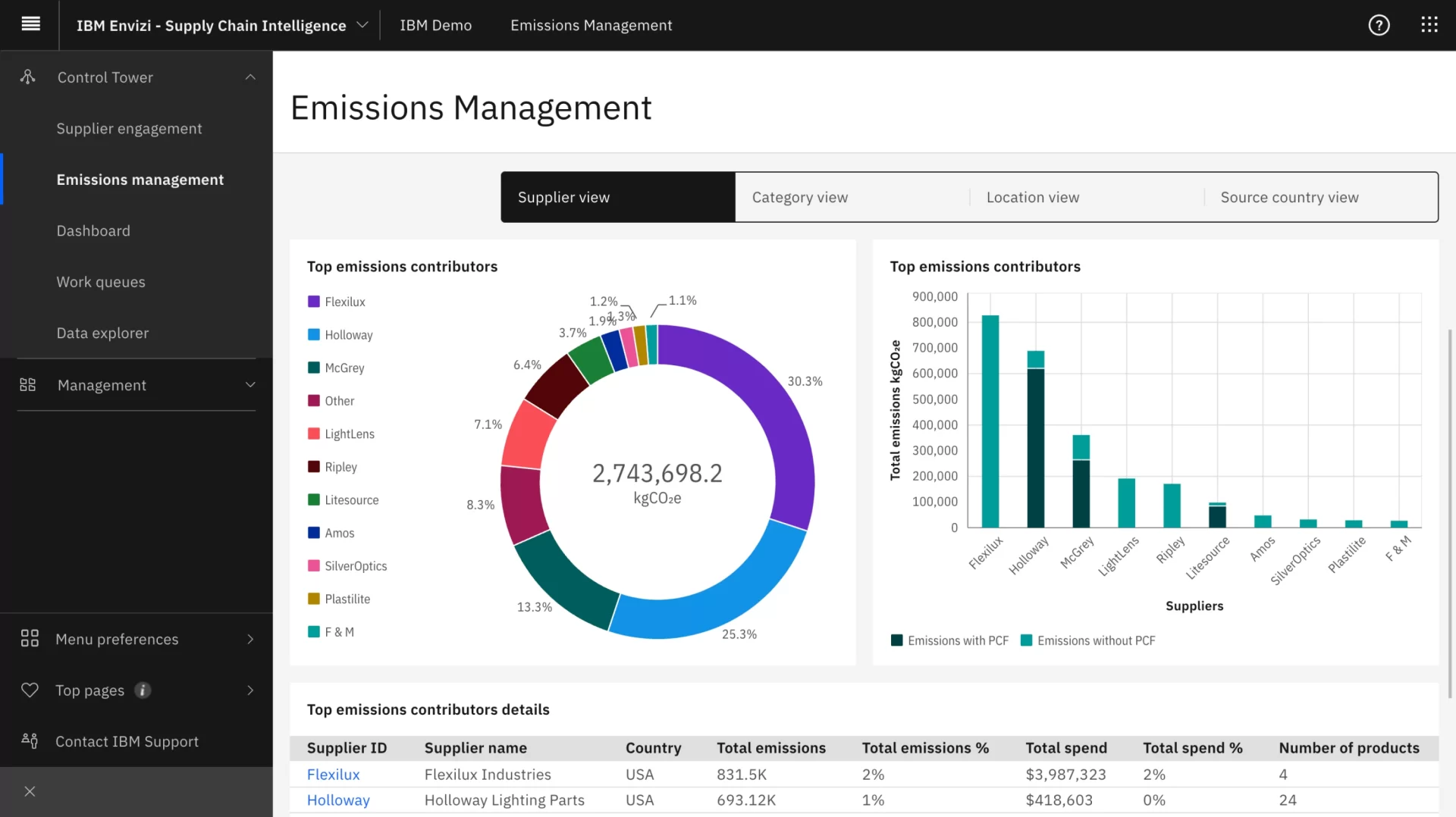
IBM Watson, a pioneer in AI technology, has established a strong reputation in the supply chain sector. It supports large enterprises seeking precise and fast decision-making capabilities across their supply chain operations.
IBM Watson Supply Chain’s prominent features are:
- Automated procurement and distribution: Streamlines supply chain operations through intelligent automation.
- Comprehensive data visualization: Presents insights in a clear and accessible format to support strategic decisions.
- Real-time risk analytics: Continuously analyzes supply chain data to detect and mitigate potential risks.
- AI-driven demand forecasting: Utilizes advanced algorithms to predict customer demand with high accuracy.
| Pros | Cons |
|
× High subscription costs × Lengthy implementation process × Requires skilled data analysts × Less ideal for small enterprises |
10. Epicor
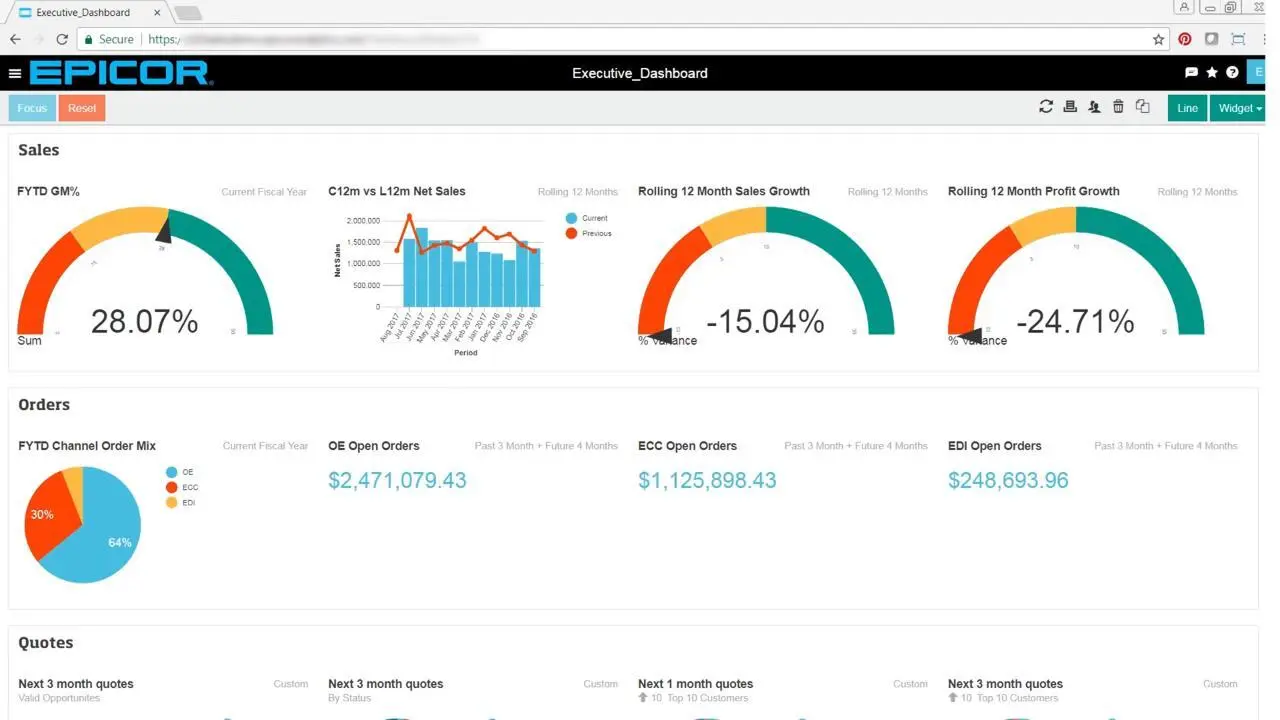
Epicor is an ERP software provider specializing in the manufacturing and distribution sectors. Backed by decades of expertise, it offers industry-specific features designed to support digital transformation and streamline operations.
Epicor’s prominent features are:
- AI-powered quality monitoring: Ensures consistent product standards by automatically detecting defects and anomalies during production.
- Seamless integration with production systems: Connects effortlessly with manufacturing processes to enhance coordination and workflow efficiency.
- Optimized inventory management: Helps maintain ideal stock levels by predicting needs and reducing excess or shortages.
- Automated production scheduling: Uses intelligent algorithms to generate efficient production plans based on real-time data and demand.
| Pros | Cons |
|
× Extended implementation timeline × Outdated user interface × Customization options are limited × Requires extensive training |
How to Choose the Best AI Supply Chain Planning Software
Selecting the right AI-driven supply chain planning software is crucial for achieving efficiency and competitiveness. Focus on features aligning with your business goals. Here are the key factors to consider when selecting the best solution for your supply chain needs.
- Define your business needs: Identify your key pain points, such as demand forecasting, inventory management, or logistics, and choose software that directly addresses these needs.
- Evaluate AI capabilities: Look for advanced features such as predictive analytics, real-time supply chain optimization, and machine learning adaptability. The software should evolve with your data.
- Ensure integration compatibility: Make sure the software integrates smoothly with your existing systems (ERP, CRM, WMS) to avoid data silos and ensure a unified workflow.
- Consider scalability: Select a solution that can scale with your business, accommodating increased data, users, or complexity as your operations expand.
- Review user experience: A clean, intuitive interface is key. Your team should be able to learn and use the system easily without excessive training.
- Check vendor support and reputation: Choose a provider with strong customer support, ongoing updates, and positive client reviews—reliability and responsiveness are crucial in fast-moving supply chains.
- Evaluate ROI potential: Analyze how the software can reduce costs, improve efficiency, or increase customer satisfaction. A good solution should deliver measurable business value.
Conclusion
AI supply chain software plays a vital role in enhancing supply chain management by increasing accuracy, improving efficiency, and enabling real-time decision-making. It helps businesses reduce operational costs and respond quickly to market fluctuations.
HashMicro’s AI Supply Chain Software provides comprehensive features tailored to meet the diverse needs of various industries. From demand forecasting to warehouse automation, it integrates seamlessly with your existing systems to streamline operations effectively.
If you’re curious about how HashMicro can enhance your supply chain, experience our free demo to see how intelligent automation can make a positive impact on your business performance. Pahusayin ang iyong pamamahala ng supply chain sa amin ngayon!

Frequently Asked Questions About AI Supply Chain Software
-
How is AI utilized in supply chain management?
AI tools, such as digital assistants or AI copilots, are used to enhance routine communication and collaboration. They automatically handle supplier inquiries, confirm orders, and update delivery statuses, making the communication process more efficient and minimizing delays.
-
Will AI completely replace supply chain management?
In short, no. While AI adoption in logistics and supply chain management is growing, it won’t replace all processes anytime soon. Many areas will still rely on human involvement, and not every environment requires AI-driven solutions.
-
What does the future hold for AI in supply chain management?
AI-driven technologies will enable supply chain managers to forecast needs more accurately, manage inventory more effectively, optimize transportation, and plan more efficiently based on demand. These advancements allow companies to reduce costs, increase agility, and enhance customer satisfaction.





































































